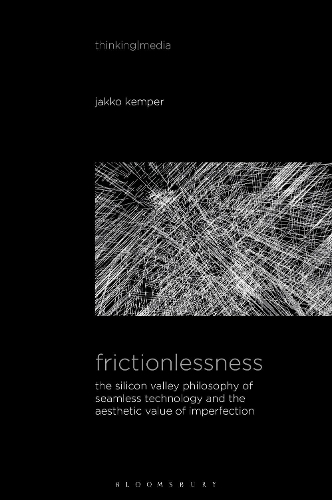
Frictionlessness: The Silicon Valley Philosophy of Seamless Technology and the Aesthetic Value of Imperfection
(Paperback)
Available Formats
Publishing Details
Frictionlessness: The Silicon Valley Philosophy of Seamless Technology and the Aesthetic Value of Imperfection
By (Author) Jakko Kemper
Bloomsbury Publishing USA
Bloomsbury Publishing USA
24th July 2025
United States
Classifications
Professional and Scholarly
Non Fiction
Technology: general issues
Technical design
Philosophy
004
Physical Properties
Paperback
200
Width 140mm, Height 216mm
Description
Frictionlessness provides an examination of the environmentally destructive digital design philosophy of "frictionlessness" and the critical significance of a technological aesthetic of imperfection. If there is one thing that defines digital consumer technologies today, it is that they are designed to feel frictionless. From smart technologies to cloud computing, from from one-click shopping to the promise of seamless streamingdigital technology is framed to host ever-faster operations while receding increasingly into the background of perception. The environmental costs of this fetishization of frictionlessness are enormous and unevenly distributed; the frictionless experience of the end user tends to be supported by opaque networks of exploited labor and extracted resources that disproportionately impact the Global South. This situation marks an urgent need for alternate, less destructive aesthetic relations to technology. As such, this book examines imperfection, as an aesthetic concept that highlights existential conditions of finitude and fragility, as a particularly powerful counterweight to the dominant digital design philosophy of frictionlessness. While frictionlessness aims to draw the users perception away from the exploitative and destructive conditions of digital production, imperfection forms an aesthetic source of friction that alerts users to the fragile nature of technology and the finite resources on which it relies. These arguments are elaborated through a close reading of three technological objectsa video game that was programmed to expire, an audiovisual performance that laments the fate of disused technology and a collection of music albums that dramatize a techno-cultural logic of relentless consumerism. Together, these case studies underline the value of technological aesthetics of imperfection and point to the need for a renewed ethics of care in relation to technology.
Reviews
Friction and limits run against everything we are told to admire and want in digital technologies today. Kemper shows us a different world, where broken is beautiful, and imperfection may offer our greatest hope. * Steven J. Jackson, Professor of Information Science and Science and Technology Studies, Cornell University, USA *
Although built on the mathematics of incompleteness, computer culture schmoozes consumers with glossy, gapless, effortless virtuosity. Expanding on philosophy in the wake of Derrida, Jakko Kemper unpacks imperfection as aesthetic tool in digital music, games and video. He shows us how to restore friction: to give us a sadder but ultimately more authentic experience of the ephemeral, precarious and scarred fragility haunting the surface sheen. * Sen Cubitt, Professor of Screen Studies, University of Melbourne, Australia, and author of Finite Media (2016) *
Theres an urgent need to critically unpack an aesthetic logic of frictionlessness which claims to miraculously eliminate pain-points and transform frustrations into ghostly wow moments of user satisfaction. As this book makes very clear, to be connected in this way (without friction) is not the kind of engagement we need right now. Silicon Valley frictionlessness is an exclusory logic that arrives like a Trojan horse, concealing exploitative, toxic effects. Jakko Kempers fearless antidote is a timely and brilliantly counter-poised mode of friction that could potentially steer us away from the carelessness of user-centrality toward sustainable modes of audience activation and care. * Tony D. Sampson, Reader in Digital Communication, University of Essex, UK, and author of A Sleepwalker's Guide to Social Media (2020) *
Author Bio
Jakko Kemper is Lecturer in New Media and Digital Culture at the University of Amsterdam, the Netherlands. His research focuses on critical theory, media aesthetics, and the environmental implications of digital technology. He previously published the edited volume, Imperfections: Studies in Mistakes, Flaws, and Failures (Bloomsbury, 2021).
